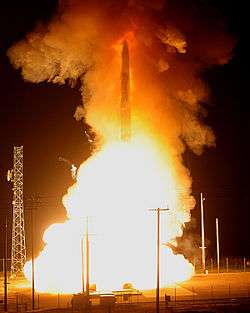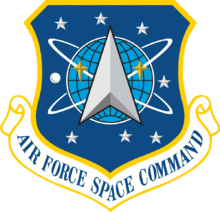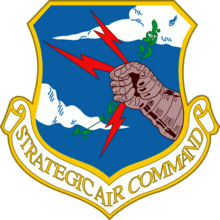740th Missile Squadron
| 740th Missile Squadron | |
|---|---|
|
LGM-30G Minuteman III test launch at Vandenberg AFB, California | |
| Active | 1943-1945; 1947–1949; 1956–1957; 1962–present |
| Country |
|
| Branch |
|
| Type | Squadron |
| Role | Intercontinental ballistic missile |
| Garrison/HQ | Minot Air Force Base, North Dakota |
| Motto(s) | Custodes Pacis Latin Custodians of Peace |
| Engagements |
World War II (EAME Theater) |
| Decorations |
Distinguished Unit Citation (2x) Air Force Outstanding Unit Award (9x) |
| Insignia | |
| 740th Missile Squadron emblem (approved 16 July 1964)[1] |
 |
| Unofficial 740th Bombardment Squadron emblem |
 |
The United States Air Force's 740th Missile Squadron is a missile operations squadron of the 91st Missile Wing, 91st Operations Group, located at Minot Air Force Base, North Dakota.
Mission
The 740th missile squadron controls and maintains 50 launch facilities and 5 missile alert facitilies.[2] The squadron is divided into missile operations flights, which are responsible for day-to-day operations, maintenance, and security, and operations support flights, which are responsible for ensuring the readiness of the missile alert facilities.[2]
History
World War II
Established as a B-24 Liberator heavy bombardment unit in mid-1943; assigned to II Bomber Command for training. Primarily trained in New Mexico and Utah received deployment orders for the Mediterranean Theater of Operations (MTO) in November 1943. Moved to Virginia where the group flew long-range convoy escort missions over the Mid-Atlantic, October–November 1943 while station in Italy was being constructed.
Deployed to Southern Italy in January 1944; entered combat in January 1944, being assigned to Fifteenth Air Force. Engaged in very long range strategic bombing missions to enemy military, industrial and transportation targets in Italy, France, Germany, Austria, Hungary, Romania, and Yugoslavia, bombing railroad marshalling yards, oil refineries, airdrome installations, heavy industry, and other strategic objectives.
In addition to strategic missions in the Balkans, the group bombed troop concentrations, bridges, marshalling yards, and airdromes during the fall of 1944 to hamper the enemy’s withdrawal from the region. The group also supported ground forces at Anzio and Cassino in March 1944; knocked out gun positions in preparation for the invasion of Southern France in August 1944; and assisted the final Allied drive through Italy in April 1945 by hitting such targets as bridges, gun positions, and troop concentrations.
Remained in Italy after the German Capitulation in May, although unit personnel were demobilized throughout the summer of 1945. Group was inactivated in Italy on 9 September 1945.
Reactivated in the Air Force Reserve in 1947 with B-29 Superfortresses. Trained at Hensley Field, Texas. Inactivated in 1949 due to budget restrictions.
Tactical Air Command
Allocated to Tactical Air Command during the 1950s. Activated at Myrtle Beach Air Force Base, South Carolina in 1956 as part of a second Fighter-Day Group planned for the new installation. Some personnel were assigned but never became operational with aircraft. Inactivated in July 1957 due to budget restrictions; personnel assigned were reassigned to 354th Fighter-Day Group.
Intercontinental Ballistic Missile Squadron
Reactivated on 1 November 1962 as an ICBM squadron assigned to the 455th Strategic Missile Wing at Minot Air Force Base, North Dakota. Initially equipped with 50 LGM-30B Minuteman Is in 1963. Reassigned to 91st Strategic Missile Wing in 1968. Upgraded to LGM-30G Minuteman III in 1968/1969, has maintained ICBMs on alert ever since.
Lineage
- Constituted as the 740th Bombardment Squadron (Heavy) on 14 May 1943
- Activated on 1 June 1943
- Redesignated 740th Bombardment Squadron, Heavy on 6 March 1944
- Inactivated on 9 September 1945
- Redesignated 740th Bombardment Squadron, Very Heavy on 27 December 1946
- Activated in the reserve on 10 January 1947
- Inactivated on 27 June 1949
- Redesignated 740th Fighter-Day Squadron on 7 May 1956.
- Activated on 25 July 1956
- Inactivated on 1 July 1957
- Redesignated 740th Strategic Missile Squadron and activated on 28 June 1962 (not organized)
- Organized on 1 November 1962
- Redesignated as 740 Missile Squadron on 1 September 1991[1]
Assignments
- 455th Bombardment Group, 1 June 1943 - 9 September 1945
- Tenth Air Force, 10 January 1947
- 455th Bombardment Group, 25 March 1947 - 27 June 1949
- 455th Fighter-Day Group, 25 July 1956 - 1 July 1957
- Strategic Air Command, 28 June 1962 (not organized)
- 455th Strategic Missile Wing, 1 November 1962
- 91st Strategic Missile Wing, 25 June 1968
- 91st Operations Group, 1 September 1991
- 91st Missile Group, 1 July 1994
- 91st Operations Group, 1 February 1996 – present[1]
Stations
- Alamogordo Army Air Field, New Mexico, 1 June 1943
- Kearns Army Air Base, Utah, 9 September 1943
- Langley Field, [Virginia, 5 October - 13 December 1943
- San Giovanni Airfield, Italy, 15 January 1944
- Bari Airfield, Italy, c. July-9 September 1945
- Hensley Field, Texas, 10 January 1947 - 27 June 1949
- Myrtle Beach Air Force Base, South Carolina, 25 July 1956 - 1 July 1957
- Minot Air Force Base, North Dakota, 1 November 1962 – present[1]
Aircraft and missiles

- Consolidated B-24 Liberator, 1943–1945
- Boeing B-29 Superfortress, 1947–1949
- LGM-30 Minuteman I, 1963–1971
- LGM-30 Minuteman III, 1968–Present
740th Missile Squadron Launch Facilities[1]
- Missile Alert Facilities (A-E flights, each controlling 10 missiles) are located as follows:
- A-1 2.3 mi WxNW of Balfour ND, 47°58′00″N 100°34′51″W / 47.96667°N 100.58083°W
- B-1 8.6 mi SxSW of Voltaire ND, 47°54′31″N 100°55′37″W / 47.90861°N 100.92694°W
- C-1 9.2 mi SxSW of Ruso ND, 47°42′52″N 101°00′36″W / 47.71444°N 101.01000°W
- D-1 1.8 mi S of Max ND, 47°47′42″N 101°17′54″W / 47.79500°N 101.29833°W
- E-1 10.8 mi SW of Douglas ND, 47°45′02″N 101°40′29″W / 47.75056°N 101.67472°W
See also
Coordinates: 48°24′57″N 101°21′29″W / 48.41583°N 101.35806°W
References
- Notes
- 1 2 3 4 5 Robertson, Patsy (May 28, 2010). "Factsheet 740 Missile Squadron (AFGSC)". Air Force Historical Research Agency. Retrieved October 22, 2016.
- 1 2 Fact Sheet: 740th Missile Squadron. Minot Air Force Base. Accessed: 3 November 2007.
Bibliography
![]() This article incorporates public domain material from the Air Force Historical Research Agency website http://www.afhra.af.mil/.
This article incorporates public domain material from the Air Force Historical Research Agency website http://www.afhra.af.mil/.
- Maurer, Maurer, ed. (1983) [1961]. Air Force Combat Units of World War II (PDF) (reprint ed.). Washington, DC: Office of Air Force History. ISBN 0-912799-02-1. LCCN 61060979.
- Maurer, Maurer, ed. (1982) [1969]. Combat Squadrons of the Air Force, World War II (PDF) (reprint ed.). Washington, DC: Office of Air Force History. ISBN 0-405-12194-6. LCCN 70605402. OCLC 72556.
- Ravenstein, Charles A. (1984). Air Force Combat Wings, Lineage & Honors Histories 1947-1977 (PDF). Washington, DC: Office of Air Force History. ISBN 0-912799-12-9.



